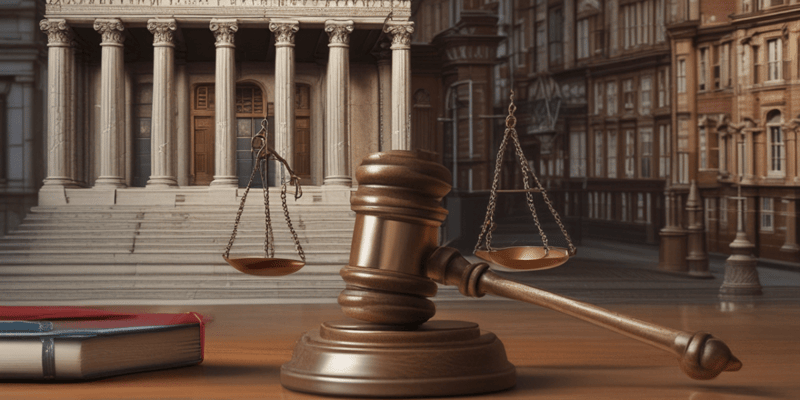Questions and Answers
What does the Latin term 'praevium' mean in the context of the principle of legality?
Previous
What is the term used to describe the creation of a crime with retrospective effect?
Ex post facto creation of crimes
What is the significance of the ius praevium rule in the context of criminal law?
It ensures that a person cannot be convicted of a crime that did not exist at the time of the act
What is the principle that states that there can be no punishment without a prior law?
Signup and view all the answers
What is the characteristic of a law that has retrospective effect?
Signup and view all the answers
What is the problem with ex post facto legislation, according to the passage?
Signup and view all the answers
What is the relationship between the ius praevium rule and the principle of legality?
Signup and view all the answers
What is the implication of the ius praevium rule for the concept of deterrence?
Signup and view all the answers
What is the principle of legality that states that nobody ought to be convicted of a crime unless, at the moment it took place, the type of conduct committed was recognised by the law as a crime?
Signup and view all the answers
What is the principle of legality that states that the law should be certain and precise, ensuring that individuals are aware of what constitutes a crime?
Signup and view all the answers
What is the principle of legality that states that criminal laws should be strictly construed, ensuring that ambiguity is resolved in favor of the accused?
Signup and view all the answers
What is the principle of legality that states that there can be no punishment without a prior law?
Signup and view all the answers
What is the principle that prohibits the application of a law retroactively, punishing an action that was not criminal at the time it was committed?
Signup and view all the answers
According to the Supreme Court of Appeal, what is an important factor in determining whether a crime has been created?
Signup and view all the answers
What should the legislature do when creating crimes, according to the principle of legality?
Signup and view all the answers
What happens when a statute creates a criminal sanction without a criminal norm, according to the court?
Signup and view all the answers
What is the implication of the ius praevium rule on the power of courts to create crimes?
Signup and view all the answers
What is the relationship between the ius acceptum rule and the ius praevium rule?
Signup and view all the answers
In what type of crimes does the court have no power to create offences?
Signup and view all the answers
Who has the responsibility for law reform in a constitutional democracy?
Signup and view all the answers
What is the principle that a court cannot convict a person of a crime that was not an offence at the time it was committed?
Signup and view all the answers
What is the principle that a court cannot create a crime that did not exist at the time it was committed?
Signup and view all the answers
What is the principle that there is no punishment without law?
Signup and view all the answers
What is the principle that a court cannot apply a law retroactively?
Signup and view all the answers
Study Notes
Principle of Legality
- The creation of a crime with retrospective effect (ex post facto) is at variance with the principle of legality.
- This application of the principle of legality is known as the ius praevium rule, which means "the law that already exists".
Ius Praevium Rule
- The ius praevium rule implies that nobody ought to be convicted of a crime unless, at the moment it took place, the type of conduct committed was recognised by the law as a crime.
- This rule implies that a court does not have the power to create a crime (ius acceptum) or convict a person of a crime that did not exist at the time it was committed.
Ex Post Facto Legislation
- Ex post facto legislation is when a law is enacted after the commission of an act, making it a crime.
- An example of ex post facto legislation is when an Act prohibits the catching of a certain type of wild bird, and declares that anyone who caught such a bird had committed a crime, with the Act being deemed to have come into operation on a previous date.
Common-Law Crimes
- Where there is no provision of the common law declaring certain conduct to be a crime, there can be no crime and therefore no punishment.
- Courts do not have the power to create offences or declare conduct to be a crime.
Statutory Crimes
- If a statute creates a criminal sanction without a criminal norm, the court will deduce that the legislature intended to create an offence, and that an offence was in fact created.
- The ideal is that the legislature stipulates the maximum punishment for the crime.
Application of Ius Praevium Rule
- The ius praevium rule applies to common-law crimes, implying that a court does not have the power to create a crime or convict a person of a crime that did not exist at the time it was committed.
- The rule also applies to statutory crimes, implying that a court cannot convict a person of a crime that was not an offence at the time it was committed.
Studying That Suits You
Use AI to generate personalized quizzes and flashcards to suit your learning preferences.





